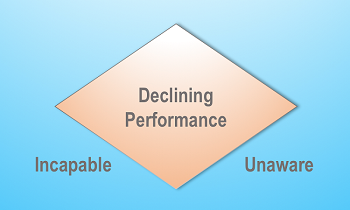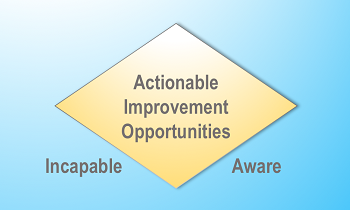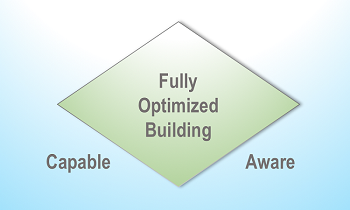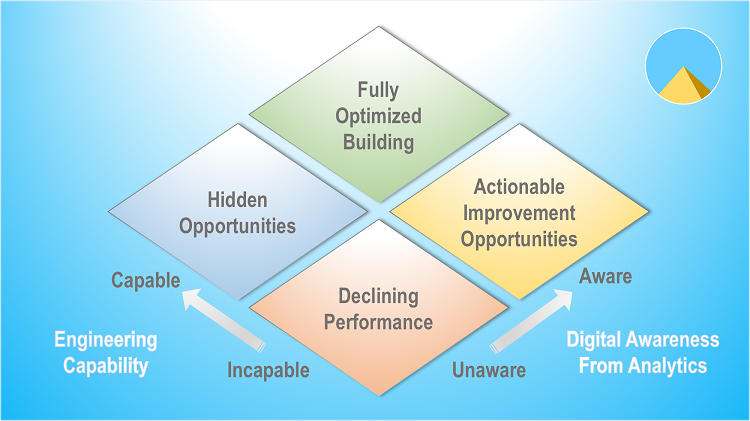|
October 2017
AutomatedBuildings.com
|
[an error occurred while processing this directive]
(Click
Message to Learn More)
|
Analytics is Only Half the Story
A truly optimized building is a delicate balance
of well designed, and maintained system through the use of digital
analytics tools and a cadre of available engineers to address matters
before they become major issues.
|

Anto Budiardjo,
Fractional Entrepreneur
anto@budiardjo.com
|
Optimizing
large and complex buildings is a challenge. The advent of big data
analytics combined with professional services have created a winning
combination to solve this dilemma, but how should building owners and
managers decide to apply these powerful tools, given their particular
circumstances.
Awareness
through analytics
Cloud analytics platforms provide a way to gain
visibility of how a building system is performing. By creating a
digital twin in the cloud, analytics can simulate the complex
engineered system of buildings to uncover sub-optimal operations. The
system alerts facility managers of issues that require engineering
resolution regardless of cause and tracks all issues to resolution.
Capability
to address issues
In most cases, problems uncovered by analytics
will need attention by an engineer. For this, the availability of
in-house and external resources is critical to fully resolve issues
detected to ensure the system continues to perform optimally. The
technical skillset required for this work is often broad, from BMS
controls to IT networking and knowledge of mechanical HVAC equipment.
A mapping of a building owner’s digital
awareness from analytics, compared to their engineering capabilities
can provide a useful understanding of the challenges and dynamics at
play in the quest to achieve the best-optimized building solution. The
matrix above produces four quadrants:
- Unaware
and Incapable - Building performance is likely in continuing
decline
- Capable
but Unaware - Resources not being deployed to optimize the
building
- Aware
but Incapable - Optimization tasks are known, but not being
performed
- Aware
and Capable - Building is, and will remain fully optimized
Building owners and managers need to balance
their resources with benefit from the expended effort. This basic
economics is particularly the case where mechanical equipment and human
activities impact the system performance over time, such as from wear
and tear. The above quadrants can help owners and managers understand
their current building optimization stance and a course of action.
Let’s dig deeper.
 Unaware and Incapable - Declining
Performance
Unaware and Incapable - Declining
Performance
Owners and managers in this quadrant either
don’t know how and/or do not have the resources to ensure their
buildings become and remain optimized. Typical sentiments here include:
- Fix equipment only when they break
- Occupants are content, presumed
comfortable
- Energy costs are within budgeted
numbers
- No desire for sustainability or
environmental responsibility
The consequence of continuing on this quadrant:
- Equipment likely not operating
efficiently
- Energy costs probably not the best it
can be
- Occupants are underperforming
 Capable but Unaware - Hidden
Opportunities
Capable but Unaware - Hidden
Opportunities
Buildings in this quadrant are likely to have
issues that are not apparent or visible to facility managers. Available
resources are not addressing the most pressing problems. Notable
outcomes in these buildings include:
- Equipment failures are typically
significant problems
- Onsite engineers need to address
hot/cold calls daily
- Energy costs savings are possible,
but no info on how to achieve
- In-house and external engineers are
not being used effectively
Recommended action:
- Install analytics to guide the
actions of engineers and vendors
- Consider a balanced in-house vs.
external engineering resources
 Aware but Incapable - Actionable Improvement
Opportunities
Aware but Incapable - Actionable Improvement
Opportunities
Through the use of analytics, facility managers
in this quadrant have a significant awareness of the issues that need
addressing in their system but do not have the time or resources to
address them. Typical attributes include:
- Needing to prioritize a sizable list
of issues to address
- Inability to commit to capital
expenditure, for whatever reason
- Not having the right technical
expertise to address issues
- Unable to properly manage vendors who
are providing services
Recommended action:
- Engage specialized professional
services firm to supplement in-house resources
- Fund the cost of services from
savings derived from addressing issues
 Aware and Capable - Fully Optimized
Building
Aware and Capable - Fully Optimized
Building
These facilities depict well-optimized buildings
through the reliant of analytics and availability of in-house and
external resources. Notable sentiments in these buildings include:
- Happy and productive occupants
- Moderate amount of downtime due to
continual maintenance work
- Building owners and managers with
good visibility of areas of concern
- Energy costs are the lowest possible,
visibly proven
A truly optimized building is a delicate balance
of well designed, and maintained system through the use of digital
analytics tools and a cadre of available engineers to address matters
before they become major issues.
Originally published on A New Deal for Buildings
blog.
footer
[an error occurred while processing this directive]
[Click Banner To Learn More]
[Home Page] [The
Automator] [About] [Subscribe
] [Contact
Us]

 Unaware and Incapable - Declining
Performance
Unaware and Incapable - Declining
Performance Capable but Unaware - Hidden
Opportunities
Capable but Unaware - Hidden
Opportunities Aware but Incapable - Actionable Improvement
Opportunities
Aware but Incapable - Actionable Improvement
Opportunities Aware and Capable - Fully Optimized
Building
Aware and Capable - Fully Optimized
Building